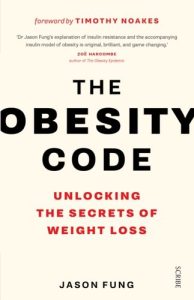Introduction
In this first book review of a new multi-part series I am writing on “Definitive Classics: Influential Books on Health in the Last 10 Years”, I will cover the New York Times bestselling book: “The Obesity Code” by Jason Fung.
Many of you may have read it back in 2016, when it was originally published, but if you have not read it or heard of it, then you are in the right place. Even if you have read the book in the past, I strongly suggest that you consider giving it another look, just as I have done recently. A good companion read is Outlive: The Science & Art of Longevity by Peter Attia. I wrote this book review back in January 2023: Peter Attia Book Review: An In-Depth Look at Outlive: The Science & Art of Longevity
In recent decades, obesity has reached epidemic proportions, posing significant health risks and challenges. With countless dieting trends and conflicting information available, it becomes increasingly difficult to navigate the complex landscape of weight loss. However, in his groundbreaking book, “The Obesity Code,” Dr. Jason Fung offers a refreshing and comprehensive approach to understanding and managing obesity. By challenging conventional beliefs and presenting a compelling case backed by scientific evidence, Fung provides readers with valuable insights into the true causes of obesity and offers effective strategies for long-term weight management.

Understanding the Obesity Epidemic
Fung begins by debunking the prevailing myth that obesity is simply the result of excessive caloric intake and a sedentary lifestyle. Drawing on his extensive medical experience, he presents a compelling argument that obesity is fundamentally a hormonal disorder caused by the disruption of insulin levels in the body. Fung dives deep into the science of how insulin affects our metabolism and fat storage, unraveling the intricate relationship between insulin resistance, hyperinsulinemia, and weight gain.
With a clear and engaging writing style, Fung breaks down complex concepts, making them accessible to readers with varying levels of medical knowledge. He draws parallels between obesity and other hormonal disorders, such as diabetes and polycystic ovary syndrome (PCOS), to illustrate the underlying hormonal imbalances that contribute to weight gain.
Unveiling the Importance of Fasting
Central to Fung’s approach is the concept of intermittent fasting, a practice that has gained considerable attention in recent years. Fasting, as Fung explains, is not about starvation or extreme deprivation but rather a strategic pattern of eating and fasting periods designed to optimize insulin levels and promote weight loss. By extending periods of fasting and reducing the frequency of meals, individuals can unlock their body’s innate ability to burn stored fat as a source of energy.
Fung expertly dissects the historical and cultural significance of fasting, showcasing its prevalence in various religions and civilizations. He further supports his arguments with scientific studies that highlight the positive effects of intermittent fasting on insulin sensitivity, fat loss, and overall metabolic health.

Reforming Dietary Guidelines
In “The Obesity Code,” the author critiques conventional dietary recommendations that have shaped public perception for decades. He argues that the prevailing advice to adopt a low-fat, high-carbohydrate diet has contributed to the rise of obesity and related metabolic disorders. Fung emphasizes the importance of differentiating between good and bad fats, highlighting the role of healthy fats in satiety, hormone regulation, and overall well-being.
Drawing upon evidence-based research, Fung presents a compelling case for reducing refined carbohydrates and incorporating whole foods into our diets. By adopting a low-carbohydrate, moderate-protein, and high-fat diet, individuals can effectively regulate their insulin levels, stimulate fat burning, and achieve sustainable weight loss.
Promoting Lifestyle Modifications
In addition to dietary changes, Fung recognizes that sustainable weight management requires more than just dietary modifications. He emphasizes the importance of addressing lifestyle factors such as sleep, stress, and physical activity. Fung explains how inadequate sleep and chronic stress can disrupt hormonal balance, leading to weight gain and metabolic dysfunction. By prioritizing restorative sleep and implementing stress reduction techniques, individuals can support their weight loss efforts and improve their overall health.
Furthermore, Fung dispels the misconception that hours spent on grueling exercise routines are necessary for weight loss. Instead, he encourages readers to focus on incorporating regular physical activity into their daily lives. Whether it’s through simple things like walking or engaging in enjoyable exercises, Fung emphasizes the importance of consistency and finding sustainable ways to increase movement.

Addressing Misconceptions and Resistance
“The Obesity Code” challenges many commonly held beliefs surrounding weight loss, and Fung anticipates and addresses potential resistance from readers. He delves into the reasons why some diets may initially lead to weight loss but ultimately fail in the long term, shedding light on the complexities of metabolism and hormonal regulation. Fung also tackles the prevalent belief that willpower and calorie counting are the keys to successful weight management, explaining how these approaches often result in a vicious cycle of deprivation and rebound weight gain.
Moreover, Fung addresses concerns about the safety and feasibility of intermittent fasting, providing evidence from clinical studies and sharing real-life patient success stories. He offers practical guidance on how to start and sustain fasting protocols, including tips to manage hunger, meal planning, and adapting fasting to individual lifestyles.
Conclusion
“The Obesity Code” by Jason Fung is a game-changing classic in the field of obesity management. By shifting the focus from calorie counting and restrictive diets to understanding the hormonal complexities of obesity, Fung provides readers with an empowering framework for sustainable weight loss. With his thorough exploration of insulin’s role, the benefits of intermittent fasting, and the importance of lifestyle modifications, Fung equips individuals with the knowledge and tools necessary to take control of their health.
Through clear and compelling explanations supported by scientific research, Fung challenges conventional wisdom and debunks prevailing myths surrounding obesity. “The Obesity Code” serves as an indispensable resource for anyone seeking a comprehensive understanding of obesity and a practical guide to long-term weight management. By embracing the principles outlined in this book, individuals can break free from the cycle of weight loss and regain control over their health and well-being.
In summary, Fung’s “The Obesity Code” is a must-read for anyone interested in understanding the complex nature of obesity and adopting evidence-based strategies for weight management. By challenging traditional beliefs, offering practical advice, and presenting scientific evidence, Fung’s book provides a roadmap for a healthier future. It is a powerful tool that empowers readers to take charge of their health and embark on a transformative journey towards sustainable weight loss and improved overall well-being.
If you enjoyed this review please share it and remember to stay tuned to healthfulhub.com for the next installment in the series: “Definitive Classics: Influential Books on Health in the Last 10 Years”
Many of you may know Patrick Bet-David and his Valuetainment Podcast. In the video below, he interviews Dr. Jason Fung in long form.

Systems Engineer > Project Manager > Tech Entrepreneur > Health Consultant > Website Specialist


